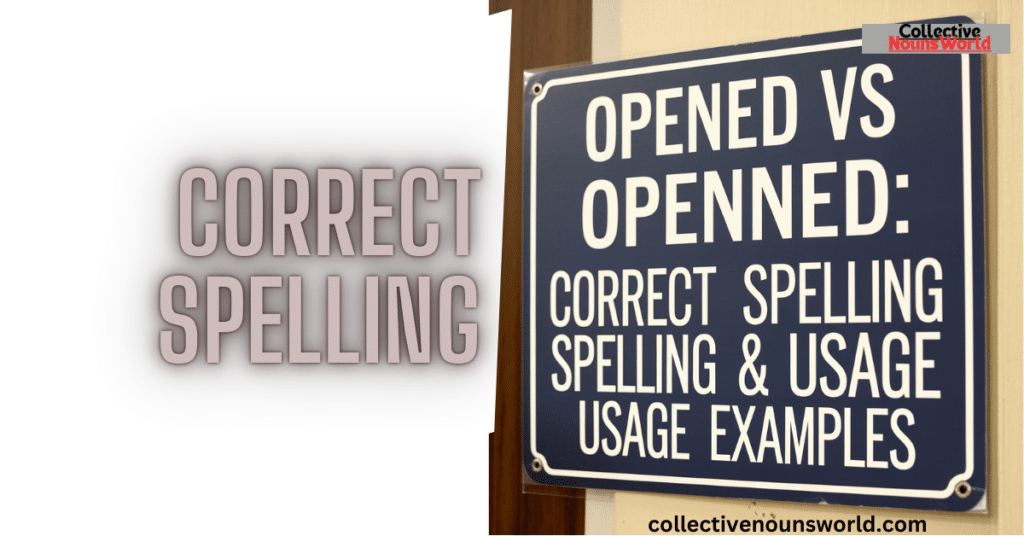When it comes to spelling and grammar, even seasoned writers can occasionally trip up. One common area of confusion arises with the words “opened” and “openned.”
While they may look similar, their meanings and correct usages differ significantly. In this article, we will explore the correct spelling, usage examples, and context for these words, ensuring you can communicate clearly and effectively.
| Term | Definition | Correct Usage | Example |
| Opened | Past tense and past participle of the verb “open.” | Used to describe an action that has already occurred. | “She opened the door for her guests.” |
| Openned | Incorrect spelling; not recognized in standard English. | Not used in proper writing or communication. | “He openned the box” (incorrect). |
Understanding the Correct Spelling
Opened: Definition and Usage
The term “opened” is the past tense and past participle of the verb “open.” It is commonly used to describe an action that has been completed. This word applies in various contexts, from everyday conversations to professional communication.
For example:
- In daily life: “I opened the window to let in fresh air.”
- In a professional setting: “The manager opened the meeting with a brief overview of the agenda.”
Openned: Why It’s Incorrect
On the other hand, “openned” is simply an incorrect spelling. In standard English, this term does not exist and should be avoided. Confusion often arises from the common addition of extra letters in the English language, but adding that extra “n” does not conform to proper spelling rules.
For example:
- Incorrect usage: “She openned the door.” (This is wrong.)
- Correct usage: “She opened the door.”
Everyday Usage Examples
Scenarios in Daily Life
Understanding how to use “opened” correctly can enhance your communication. Here are some scenarios that illustrate the proper use of “opened”:
- Scenario in a Home Setting:
- Incorrect: “He openned the fridge to grab a drink.”
- Correct: “He opened the fridge to grab a drink.”
- Scenario in School:
- Incorrect: “The teacher openned the classroom for the students.”
- Correct: “The teacher opened the classroom for the students.”
- Scenario in Technology:
- Incorrect: “The programmer openned the application to fix a bug.”
- Correct: “The programmer opened the application to fix a bug.”
Scenarios in Business Communication
In the realm of business, using correct spelling is crucial. Here are examples illustrating the proper usage of “opened” in a business context:
- Meeting Context:
- Incorrect: “The CEO openned the presentation with an impressive statistic.”
- Correct: “The CEO opened the presentation with an impressive statistic.”
- Project Launch:
- Incorrect: “We openned our new office last month.”
- Correct: “We opened our new office last month.”
- Event Planning:
- Incorrect: “The event coordinator openned the registration desk early.”
- Correct: “The event coordinator opened the registration desk early.”
Read more about Top Hackathon Team Names: Stand Out in Your Competition
Importance of Correct Spelling in Professional Settings
Using the correct spelling, such as “opened,” conveys professionalism and attention to detail. In business communications, clear and precise language is key to ensuring that your message is understood and taken seriously. The incorrect spelling of “openned” can undermine your credibility and lead to misunderstandings.
Tips for Improving Your Spelling Skills
- Read Regularly: Engage with various materials—books, articles, and reports—to familiarize yourself with correct spellings.
- Use Dictionaries: When in doubt, consult a dictionary to verify the spelling and meaning of a word.
- Practice Writing: Write short passages and pay attention to your spelling. Tools like spell-check can help catch mistakes.
- Seek Feedback: Ask teachers or peers to review your writing for errors.
- Play Word Games: Engage in puzzles and games that reinforce spelling and vocabulary.
The Role of “Opened” in Different Contexts
Literature and Art
In literature, “opened” can convey deeper meanings. For example, a book may have “opened” a new perspective for readers. Artists may speak of how their work has “opened” dialogue about societal issues. Such uses highlight the importance of precise language in conveying powerful ideas.
Sports and Events
In sports, the term “opened” marks significant beginnings. The “opening ceremony” of the Olympics or the kickoff of a major game signifies the start of an exciting event. These moments resonate with fans and participants alike, underscoring the significance of proper language in commemorating achievements.
Read more about 170+Up Your Gaming Experience with Cool Gaming Names
Understanding Related Phrases
Common Idioms with “Open”
The phrase “open to” is frequently used in English, meaning to be receptive or willing to accept new ideas. For example, if someone says they are “open to suggestions,” they are indicating their readiness to consider other viewpoints. This idiom enhances communication by promoting flexibility and understanding.
Phrasal Verbs Involving “Open”
The phrasal verb “open up” means to become more communicative or to disclose feelings. For instance, “He decided to open up about his struggles,” conveys that the person is sharing personal information, which can strengthen connections between individuals.
Conclusion
knowing the correct usage of “opened” versus the incorrect “openned” is essential for effective communication. By mastering the correct spelling, you can express your thoughts with clarity and professionalism. This attention to detail not only enhances your writing but also fosters a deeper understanding between you and your audience.
Whether in daily conversations, business communications, or creative endeavors, using the right words is key to leaving a lasting impression. Remember, clear communication begins with precise language—so always choose “opened” and steer clear of “openned.”

Luna Jasper is an experienced blogger with a passion for language and grammar. At **Collective Nouns World**, she shares her expertise in exploring the fascinating world of collective nouns, making learning both engaging and fun. With years of writing and research under her belt, Luna’s insightful articles help readers understand and appreciate the English language.







